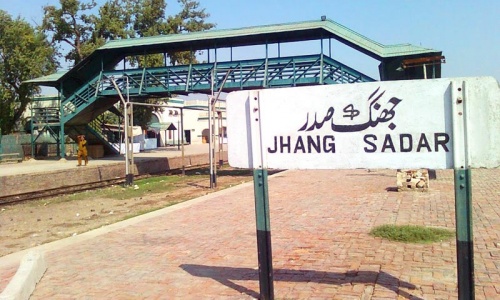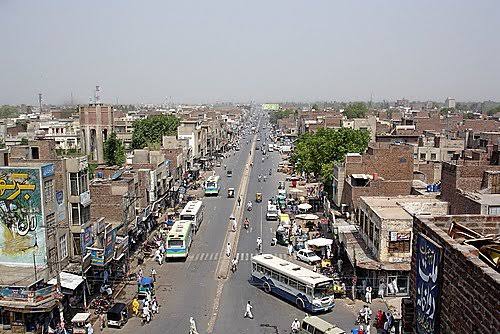Information
 |
| Jhang |
Jhang Sadar is Historically known as Jhang-Maghiana, Jhang Sadar is the administrative center of Pakistan's Punjab province's Faisalabad division and is located just east of the Chenab River. It is made up of two historic twin towns. The settlements of Maghiana and Jhang were combined to form the city when it was first established as an administrative division during the British Raj.
While Jhang resides in the lowlands at the valley's base, Maghiana is perched on a ridgetop overlooking it. They are connected to Peshawar and Lahore via two routes as well as the Grand Trunk Road.
Originally formed in 1462 CE and rebuilt in 1688 after a flood destroyed the first settlement, Jhang has lost some of its significance in favor of Maghiana, which was established by Megha, the progenitor of the Maghiana Sials. Maghiana is a hub for the collection of wool and is home to handloom enterprises that produce products including soap, leather, locks, and brass work. There is a government blanket manufacturing facility in Jhang, along with other textile companies.
A hospital, public garden, and a government institution connected to the University of Punjab are located in the twin towns, which became a municipality in 1867.
Around Jhang and Maghiana, agriculture predominates. Wheat and cotton are grown under irrigation using the Chenab Canal system. Alexander the Great might have taken control of a city at the Shorkot ruins, south of Jhang Sadar, in 325 BCE. Pop. (1998) 293,366; (2017) 414,309.
Etymology
Jhang Sial is the city's and district's historical name.
The Sanskrit term jgala, which means rugged or forested terrain, is where the English word "jungle" derives from. Jhang Sial, the area's traditional name, literally means "The terrain of the Sials," and the title Jhang was derived from the Sanskrit word jgala in context.
History
Alexander's Greek army camped here at Jhang and stayed for a while to make preparations before moving on. Several local tribes, including the Vains, Longs, Nauls, and Noons, are said to be descended from Alexander's army members.
Since the nearby city of Multan was taken by Muhammad bin Qasim, the region of Jhang was ruled by Arabs for several centuries. The town of Jhang afterward joined the Mamluk province of Multan, which was governed by various sultans.
 |
| Jhang In Old Days |
The Sial tribe's history is Jhang's history.
Maharaja Rai Sial, a Rajput chief and the originator of the Sial Tribe, constructed Jhang in 1288.
From that time until Ranjit Singh's victory over Ahmad Khan (1812–1822), the last Sial monarch of Jhang, the Sial tribe—his kin—ruled this region.
The Sial nation of Jhang, which included the entirety of the Chiniot, Kamalia, and Kabirwala lakes, was governed collectively by the Sial Khans of Jhang and other Sial sub-tribes like the Rajbana and Bharwana during the height of their dominance. It included portions of Bhakkar and Sargodha. By the middle of the 17th century, the Rajbana Sial clan had expelled the Baloch tribes from the Thal and conquered the Nawab of Multan, adding the Garh Mahraja and Ahmadpur Sial lakes to their holdings.
The towns of Jhang and Mighiana, which are 3.2 kilometers (2.2 miles) apart, joined to form the municipality of Jhang-Maghiana during the British Raj.
While the older town of Jhang is located in the lowlands at its base, Maghiana is perched on the edge of the hills, overlooking the Chenab alluvial valley.
Geography
Jhang is located close to the town of Athara Hazari on the East Bank of the Chenab, which joins the Jhelum at the Trimmu Barrage. The city was at risk of flooding in 2014, but it was spared because the floodwaters were diverted to Athara Hazari. There are three rivers in Jhang, including the Chenab, Jhelum, and River Ravi, which also touches the district's boundary close to Ahmadpur Sial.
Demographics
293,366 people were living in the city according to the Pakistani Census of 1998. The population of the city increased by 41.17% in 19 years, reaching 414,131, according to the Pakistani Census of 2017.
Administration
The administrative hub of Jhang Tehsil, a part of the district, is Jhang Saddar. There are 55 Union councils within the tehsil alone.
Education
University of Lahore College for Women (Jhang Campus)
The Jhang Campus of the University of Veterinary and Animal Sciences
public postgraduate institution
Colleges in the Chenab College Jhang University of Jhang Punjab Group
Better Group of Universities
Schools in Dar es-Arqam
Grammar School of Cambridge
System of Schools at Beaconhouse
The City College
Scientists
Politicians
Har Gobind Khorana, an Indian-American biochemist
Khan Abdul Arif Khan Rajbana Sial was a prominent member of the Pakistan Independence Movement and a former federal and provincial minister. She is also the Chief Whip of the All-India Muslim League and a close friend of Quaid-e-Azam.
Former federal minister and Pakistani ambassador to the United States, Syeda Abida Hussain.
Former Pakistani interior minister and FIFA official Makhdoom Faisal Saleh Hayat.
Former National Assembly member Sahibzada Nazir Sultan.
Federal minister Sahibzada Mahboob Sultan.
Ghulam Bibi Bharwana is an assemblyperson.
Former National Assembly and Provincial Assembly member Najaf Abbas Sial.
Former State Minister of Labor and Manpower Sheikh Waqas Akram
The founder of Sipah-e-Sahaba Pakistan and the namesake of Lashkar-e-Jhangvi is the Pakistani preacher Haq Nawaz Jhangvi.
Masroor Nawaz Jhangvi is the son of Haq Nawaz Jhangvi and an Islamic politician in Pakistan. He is a member of the Punjab Provincial Assembly (MPA).
Personalities in sports
Aleem Dar is a cricketer and official.
Ghulam Shabbir, a cricketer from the UAE
Literature figures
Majeed Amjad, poet in Urdu
Columnist Nasir Abbas Nayyar from Pakistan writes in Urdu.
The author of the fiction Ishtiaq Ahmad
Pirs and religious leaders
the founder of the Sarwari Qadiri Sufi order, Sultan Bahu
Sufi saint and the creator of the Qalandariyya order, Shah Jeewna
Shalimar Transport's founder, Sheikh Waqas Akram
Read more about most asked question on google about jhang
